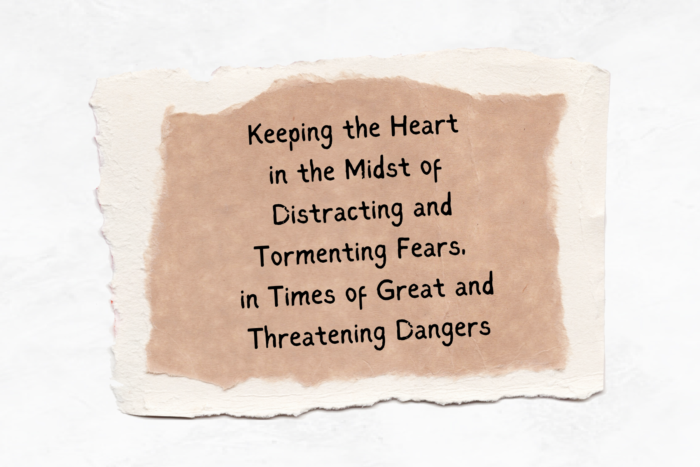Keeping the Heart in the Midst of Distracting and Tormenting Fears, in Times of Great and Threatening Dangers
That is quite a title today, isn’t it? I tried to shorten it but nothing quite captured the meaning as the author’s original title of this section in his book. What book, you may ask? It is a book called “Keeping of the Heart”. The author is John Flavel, a Puritan pastor. Written in the 17th century, this little book is a vivid reminder that human trials and struggles do not change all that much through the centuries. The book was given to me as a gift and I am finally reading it (and learning a lot). The other day as I was reading I came across this section by the name of the title above and was greatly impacted. I knew I wanted to share it with you, my readers.
I think most of us, at some time or other, struggle with fear. Sometimes the fears are because we really are in danger. Other times, our fears are unfounded or imagined. Other times, we are just overwhelmed with a sense of anxiety because of the convergence of a different life circumstances. Our fears can arise from health issues, from financial concerns, from controversies with others– sometimes with our own family, and from many other things.
There is so much to be fearful and anxious about in this life. And that fear–sinful fear– can lock us in a prison from which we struggle to get out. I know because I’ve been there several times throughout my life. It’s not a place of joy and peace. It’s a place of darkness and doubt. And so I thought I’d share this for any of us who is living in fear now or who struggles with this sometimes. I hope it may be a post you can mark for later. A post that can be brought up over and over again, as needed, to remind us what we can do when we are feeling fearful.
I am unable to share the whole section written by Flavel so I will share his 14 main principles (his words are in italics) to consider as we fight our own fear and anxiety and then add just a bit of commentary to his main thoughts. I do recommend getting your own copy of this book as he expands on his points with lots of scripture and thoughtful insight. I’ll add the link for the book at the bottom of this post.
Now let us inquire how a Christian may keep his heart from distracting and tormenting fears in times of great and threatening dangers. There are several excellent rules for keeping the heart from sinful fear when imminent danger threatens us:
1. Look upon all creatures as in the hand of God, who manages them in all their motions, limiting, restraining, and determining them at his pleasure.
Oh, what a needed reminder when we are feeling fear! Not one person or event or dynamic is outside God’s Sovereignty. Nothing can happen to you unless it’s been allowed by God.
2. Remember that this God in whose hand are all creatures, is your Father, and is much more tender of you that you are, or can be, of yourself.
God cares for us more and way better than we could ever care for ourselves. If we are His, then He is with us, giving us grace and showering us with His tender mercies on any path we take. I think this is easy to forget, especially when we are walking in a deep, dark valley.
3. Urge upon your heart the express prohibitions of Christ in this case, and let your heart stand in awe of the violation of them. He hath charged you not to fear…If I let into my heart the slavish fear of man, I must let out the reverential awe and fear of God; and dare I cast off the fear of the Almighty for the frowns of a man?
Jesus Himself commanded us not to worry but to trust Him, reminding us that, if God cares for the birds and the flowers, how much more He cares for His own. Read Matthew 6:25-24 and be reminded of what Jesus has to say about the sin of worry.
4. Remember how much needless trouble your vain fears have brought upon you formerly…[when it doesn’t come to pass], you have wasted your spirit, disordered your soul, and weakened your head to no purpose.
This one struck me profoundly. Oh, the time and effort wasted as I nursed a fear that never happened. The peace of mind lost; the bright and happy times that never were because I was too upset and fearful to enjoy being with my family or others. Ungodly fear yields so much bad fruit.
5. Consider solemnly, that though the things you fear should really happen, yet there is more evil in your own fear than in the things feared.
And another profound thought. I never, ever even considered this. I can’t control what happens but I can control my response to what happens. Considering that unholy fear is a sin before God sheds such glaring light on this topic. In fact, our sin is more evil than what we fear. It doesn’t feel like that but if we stop and think about this from a biblical perspective, then we must admit this is true.
6. Consult the many precious promises which are written for your support and comfort in all dangers.
God’s Word is so powerful and full of promises. It’s best to hide His Word in our heart so that it is at the ready at all times. I was talking to someone about the benefit of scripture memorization just the other day. I can’t overestimate the role that memorized verses have played through the years in unlocking the prison of fear. God’s Word reminds us what is TRUE and helps us turn away from the lies.
7. Quiet your trembling heart by recording and consulting your past experiences of the care and faithfulness of God in former distresses. These experiences are food for your faith in a wilderness.
Reflecting on God’s great kindnesses and mercies in other situations of our lives will remind us of His awesome faithfulness and care. If we have been God’s redeemed child for even a short while, our lives will have these gems sprinkled throughout our years.
8. Be well satisfied that you are [in God’s will in your duties and life choices] and that will beget holy courage in times of danger.
If we have repented of all sin and are confident we are in God’s will for our lives, then we can take courage. God does not forsake those that seek Him (Psalm 9:9-10). We are safe if we are in His will. He will not forsake us but, instead, will provide all we need. He has promised.
9. Get your conscience sprinkled with the blood of Christ from all guilt, and that will set your heart above all fear.
Flavel writes further, “A guilty conscience is more terrified by imagined dangers, than a pure conscience is by real ones.” This principle reminds us that we must be regularly confessing all sin (including sinful fear) and to keep our heart clean before God. This will go a long way in bringing peace to our hearts in the midst of great trial.
10. Exercise holy trust in times of great distress. Make it your business to trust God with your life and comforts, and then you heart will be at rest about them.
When it all shakes down, this is the heart of it all. Do I trust God? If we are living in fear, the answer is most definitely no.
11. Consult the honor [of God] more and your personal safety less.
Oh, and again, how profound. And how convicting! This has always been one of my biggest issues–I am far too concerned about myself. But Flavel reminds us that we should care more about God and His plan than we do about our own lives. This is a challenging call to us all. We naturally worry about the things of this life and keep our eyes on the things of this world, rather than looking above and keeping our minds set on God’s eternal plan.
12. He that would secure his heart from fear, must first secure the eternal interest of his soul in the hands of Jesus Christ.
When we are assured that we will be safe and secure for all eternity, it gives us a different perspective on the temporal things of this life. I am often reminded of this short verse, written by Paul, in the book of Philippians — “For to me, to live is Christ, and to die is gain.” (Philippians 1:21) Clearly, Paul had eternal perspective.
13. Learn to quench all slavish creature-fears in the reverential fear of God. This is a cure by diversion.
Sinful fear can’t stand in the face of reverential fear of God. If we understand Who God really is and know Him, through His Word, then sinful fear melts away in the reality of His omnipotence and sovereignty.
14. Pour out to God in prayer those fears which the devil and your own unbelief pour in upon you in times of danger.
We should never underestimate the power of prayer. For it is God who has the power to unlock that prison of fear we can sometimes find ourselves residing in. He, through the power of the Holy Spirit in our lives, can eradicate our unbelief and remove the turmoil from our hearts. We must call out to Him in our despair.
I hope this list has given you pause for thought and is useful to you the next time you are overwhelmed by fear, whether real or imagined.
There is no shortage of things to fear in this life but we have an all-powerful God that supersedes them all. If we are His own, saved by faith in Christ alone, then we are assured of His everlasting love for us and can rest, knowing that He cares for us very personally. Oh, to learn to trust Him!
You can purchase Keeping the Heart here. I receive nothing for sharing this link with you but simply share so that you, too, can benefit from this wonderful little book!










